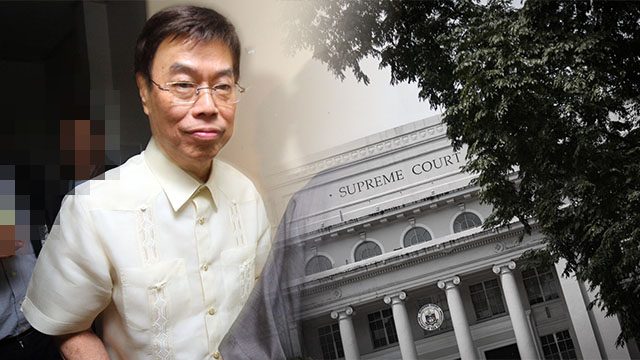SUMMARY
This is AI generated summarization, which may have errors. For context, always refer to the full article.

MANILA, Philippines – After he lost his appeal to Justice Secretary Menardo Guevarra to stop the reinvestigation into his alleged links to the Visayan drug trade, Cebu-based businessman Peter Lim is now counting on the Supreme Court (SC) to clear him once again.
In a 47-page petition for certiorari filed with the Supreme Court on May 30, Lim asked the SC to issue a temporary restraining order against the ongoing DOJ reinvestigation, and to reinstate the first decision of prosecutors that cleared him of drug charges.
Lim’s basis for the petition is his constitutional right to due process. He also said that the public uproar over the dismissal of his charges was not a legal basis for former justice secretary Vitaliano Aguirre II to order a fresh investigation.
What the petition states: Lim claimed that the DOJ “grossly and blatantly” violated his right to due process and speedy disposition of cases when it opened a reinvestigation.
“The DOJ gravely abused its discretion in vacating the first panel of prosecutors’ resolution based merely on perceived nationwide uproar and public outrage over the dismissal of the case against petitioner,” Lim said.
It was Aguirre who said in a press conference that the public uproar prompted him to order the reinvestigation, basically voiding the earlier decision to clear Lim and the other respondents.
Lim called this a “mob rule” and appealed to the SC “to determine whether mob rule may prevail over the rule of law.” (READ: Where is the NBI in the Peter Lim-Kerwin Espinosa investigation?)
“It is of paramount national interest for this Honorable Court to determine whether the perceived nationwide uproar and public outrage may overturn a resolution with sound legal basis, and be used to extend or reopen a preliminary investigation of a case previously dismissed due to insufficiency of evidence,” Lim said.
He added that it is also a “dangerous precedent” to allow the complainant – the Criminal Investigation and Detection Group (CIDG) of the Philippine National Police (PNP) – to gather more evidence to pin him down in the reinvestigation.
“Aside from its being unprocedural, it will open the floodgates to endless litigations because whenever an accused is on the brink of acquittal of trial, and realizing its inadequacy, the prosecution would insist to be allowed to augment its evidence when it should have been presented earlier,” Lim said, citing a previous SC ruling.
Parallelism with De Lima case: The SC would be closely watched how it decides on Lim’s petition because of the parallelism with the case of detained Senator Leila de Lima, whose arrest it recently affirmed in a majority vote of 9-5.
The first panel of prosecutors cleared Lim because it considered as insufficient the testimony of lone witness Marcelo Adorco, who confessed to transacting drugs with Lim on behalf of his boss Kerwin Espinosa.
Lim cited an SC ruling: “The Honorable Court held in both Salonga and Allado that it cannot validate the filing of an information which solely rests on the testimony of an incredible witness.”
De Lima also used that argument when she went to the SC, but she was denied because the majority upheld the DOJ’s conclusion that testimonies of drug convicts against her were a strong suggestion of involvement in the drug trade. Dissenting Justice Benjamin Caguioa slammed this ruling as a violation of De Lima’s constitutional rights.
The CIDG sees it the other way. For them, if the DOJ indicted De Lima based on testimonies, then they should also indict Lim for the same. (READ: 2002 House report proves Peter Lim lied over drug links – gov’t lawyers)
Lim also justified his running to the SC, saying his case is exempt from the principle of hierarchy of courts.
When it denied De Lima’s petition, majority of the justices said De Lima violated the hierarchy of courts by not waiting for a trial court’s resolution first.
The consistency of the SC will be put to the test when it acts on Lim’s petition.
Lim offered to pay a bond, “to the effect that it will pay to the respondents all damages which they may suffer by reason of the injunction if this Honorable Court should finally decide that petitioner is not entitled thereto.”
What went before: A panel of prosecutors cleared Lim, Espinosa, and drug convict Peter Co of illegal drug trade charges, citing insufficient evidence.
When the dismissal was made public, pressure mounted on Aguirre as well as President Rodrigo Duterte to prove the efficiency of the campaign against drugs.
Aguirre voided the dismissal, ordered an investigation against the prosecutors who cleared the alleged drug lords, and assembled a new team of prosecutors to conduct a reinvestigation.
Lim appealed to Guevarra to undo Aguirre’s action, but to no avail. The reinvestigation led by Senior Assistant State Prosecutor Juan Pedro Navera is ongoing. The Office of the Solicitor General (OSG) is the lead counsel for the CIDG. – Rappler.com
Add a comment
How does this make you feel?
There are no comments yet. Add your comment to start the conversation.